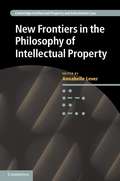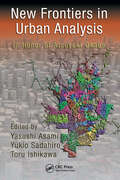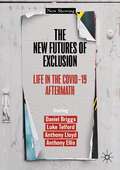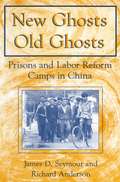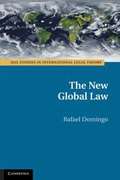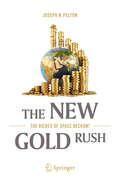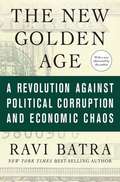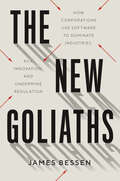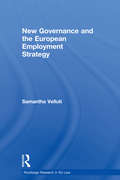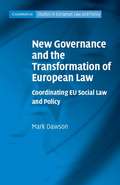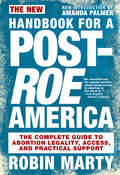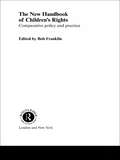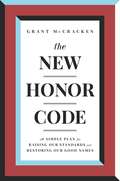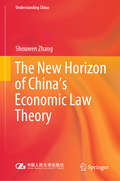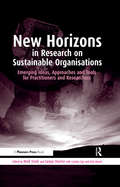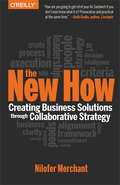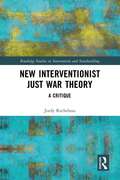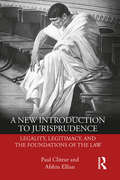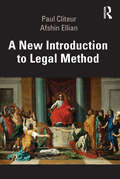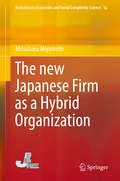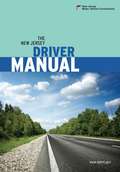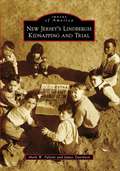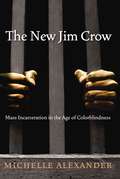- Table View
- List View
New Frontiers in the Philosophy of Intellectual Property
by Annabelle LeverAre intellectual property rights a threat to autonomy, global justice, indigenous rights, access to lifesaving knowledge and medicines? The essays in this volume examine the justification of patents, copyrights and trademarks in light of the political and moral controversy over TRIPS (the Agreement on Trade-Related Aspects of Intellectual Property Rights). Written by a distinguished international group of experts, this book draws on the latest philosophical work on autonomy, equality, property ownership and human rights in order to explore the moral, political and economic implications of property rights in ideas. Written with an interdisciplinary audience in mind, these essays introduce readers to the latest debates in the philosophy of intellectual property, whether their interests are in the restrictions that copyright places on the reproduction of music and printed words or in the morality and legality of patenting human genes, essential medicines or traditional knowledge.
New Frontiers in Urban Analysis: In Honor of Atsuyuki Okabe
by Yasush I Asami Yukio Sadahiro Toru IshikawaBringing together the world's leading experts in Urban Analysis, this remarkable and critically acclaimed volume applies the theories and models of Atsuyuko Okabe, Japan's preeminent spatial analyst, to case studies in urban planning, transport, administration, and public health in the context of the highly advanced Japanese planning system. It inc
The New Futures of Exclusion: Life in the Covid-19 Aftermath
by Daniel Briggs Luke Telford Anthony Lloyd Anthony EllisBased upon global data and following on from Lockdown: Social Harm in the COVID-19 Era, this book discusses the rise of surveillance capitalism and new forms of control and exclusion throughout the Covid-19 pandemic. It particularly addresses the use of vaccine passports, mandates and the new forms of capital extraction and political control that emerged throughout the pandemic. The book also explicates how the ‘vaccine hesitant’ became marginalized in both mainstream discourse and through regulatory interventions. Whilst the book addresses the wider political economy within which so-called ‘anti-vaxxers’ were ostracized, it also explores the complex nature of their sentiments. The book closes by considering The New Futures of Exclusion, outlining the forms of surveillance and control that may be implemented in the future particularly in light of the challenges brought by global warming and the energy transition. It is a broadly accessible text, particularly appealing to policymakers, general readers and academics in sociology, political sociology, politics, human geography, political economy, criminology, social policy, psychology, history, and infectious diseases and medicine.
New Ghosts, Old Ghosts: Prisons and Labor Reform Camps in China (Socialism And Social Movements Ser.)
by James D. Seymour Michael R AndersonMuch has been written about the laogai (sometimes likened to the Soviet gulag) in the People's Republic of China. Depending on the source, the prisons are described as nonexistent, enlightened institutions, or hellish places that subject the inmates to degradation and misery. The system is commonly thought of (by admirers and critics alike) as having a measurable impact on the national economy and providing significant resources to the state. Based on research in classified documents and extensive interviews with former prisoners, judicial personnel, and other insiders, and featuring case studies dealing with the three northwestern provinces, this book examines such assertions on the basis of the facts about this underexamined subject in order to arrive at a detailed, objective, and realistic picture of the situation. In the case of each province under study, the authors discuss the history of the provincial prison system and the impact that each has had at the macro, meso, and micro levels.
The New Global Law
by Rafael DomingoThe purpose of this book series is to clarify and improve the theoretical foundations of international law. Too often the progressive development and implementation of international law have foundered on confusion about first principles. This series will raise the level of public and scholarly discussion about the structure and purpose of the world legal order and how best to achieve global justice through law.
The New Gold Rush: The Riches of Space Beckon!
by Joseph N. PeltonThis book captures the most exciting advances in the harnessing of space as a global resource. The authors track the growing number of space businesses and opportunities for investors, and the many possible benefits of spaceplanes, space stations and even space colonies. The authors also discuss the need for more regulatory reform. Companies like Planetary Resources are now forming to find mineral-rich asteroids and bring back new riches to Earth. Solar power satellites in the next few years will start to beam clean energy back to Earth, to meet the growing demands of a still-developing world. Innovative space industries are vital to the survival of modern human life, and the authors demonstrate what can be done to encourage the growing of the "New Space" frontier. From lassoing and then mining asteroids to developing new methods of defending the planet from space hazards and setting up new hotels and adventures for tourists in space, this new industry will have profound effects on Earth, especially on its economy. This book is based on a study of international experts commissioned ahead of the UNISPACE+50 meeting, having distilled the results of this comprehensive fact-finding process into a compact and very readable form. It can serve as an excellent starting point for understanding all the activities underway or planned to make space truly our next frontier.
The New Golden Age: The Coming Revolution against Political Corruption and Economic Chaos
by Ravi BatraBringing his signature insight and expertise, the controversial economist Ravi Batra takes on a host of problems facing the world economy, including the oil and housing bubbles, falling minimum wages, corporate scandals and gross ethical lapses.
The New Goliaths: How Corporations Use Software to Dominate Industries, Kill Innovation, and Undermine Regulation
by James BessenAn approach to reinvigorating economic competition that doesn’t break up corporate giants, but compels them to share their technology, data, and knowledge “Bessen is a master of unpacking the nuances of a complex array of interrelated trends to build a coherent story of how the promise of the democratized Internet ended up under the control of just a few. Read The New Goliaths to see how the forest came to have only room for a few tall trees with the rest of us in the undergrowth.”—Joshua Gans, coauthor of Prediction Machines: The Simple Economics of Artificial Intelligence Historically, competition has powered progress under capitalism. Companies with productive new products rise to the top, but sooner or later, competitors come along with better innovations and disrupt the threat of monopoly. Dominant firms like Walmart, Amazon, and Google argue that this process of “creative destruction” prevents them from becoming too powerful or entrenched. But the threat of competition has sharply decreased over the past twenty years, and today’s corporate giants have come to power by using proprietary information technologies to create a tilted playing field. This development has increased economic inequality and social division, slowed innovation, and allowed dominant firms to evade government regulation. In the face of increasing calls to break up the largest companies, James Bessen argues that a better way to restore competitive balance and dynamism is to encourage or compel these companies to share technology, data, and knowledge.
New Governance and the European Employment Strategy (Routledge Research in EU Law)
by Samantha VellutiIn recent years new or experimental approaches to governance in the EU, namely the Open Method of Coordination (OMC), have attracted great interest and controversy. This book examines the European Employment Strategy (EES) and its implementation through the OMC, exploring the promises and limitations of the EES for EU social law and policy and for the safeguard of social rights. This significant and timely work offers new insights and fresh perspectives into the operation of New Governance and its relationship with both European and national law and constitutionalism. This book will be of great interest to academics, researchers and postgraduate students working in European law – specifically in the field of EU employment law and gender equality – and European governance studies in general.
New Governance and the Transformation of European Law
by Mark DawsonThe development of non-binding new governance methods has challenged the traditional ideals of EU law by suggesting that soft norms and executive networks may provide a viable alternative. Rather than see law and new governance as oppositional projects, Mark Dawson argues that new governance can be seen as an example of legal 'transformation', in which soft norms and hard law institutions begin to cohabit and interact. He charts this transformation by analysing the Open Method of Coordination (OMC) for Social Inclusion and Protection. While this process illustrates some of the concrete advantages for EU social policy which new governance has brought, it also illustrates their extensive legitimacy challenges. Methods like the OMC have both excluded traditional institutions, such as Courts and Parliaments, and altered the boundaries of domestic constitutional frameworks. The book concludes with some practical suggestions for how a political 'constitutionalisation' of new governance could look.
New Handbook for a Post-Roe America: The Complete Guide to Abortion Legality, Access, and Practical Support
by Robin MartyA completely new edition--with a new introduction by Amanda Palmer--of Robin Marty's best-selling manual on what to do if/when Roe v. Wade is overturned.The New Handbook for a Post-Roe America is a comprehensive and user-friendly manual for understanding and preparing for the looming changes to reproductive rights law, and getting the health care you need. Activist and writer Robin Marty guides readers through various worst-case scenarios of a post-Roe America, and offers ways to fight back, including: how to acquire financial support, how to use existing networks and create new ones, and how to, when required, work outside existing legal systems. She details how to plan for your own emergencies, how to start organizing now, what to know about self-managed abortion care with pills and/or herbs, and how to avoid surveillance. The only guidebook of its kind, The New Handbook for a Post-Roe America includes new chapters that cover the needs and tools available for pregnant people across the country. This second edition features extensively updated information on abortion legality and access in the United States, and approximately one hundred pages of new content, covering such topics as independent alternatives to Planned Parenthood, "auntie networks," taxpayer-funded abortions, and using social media wisely in the age of surveillance.
The New Handbook of Children's Rights: Comparative Policy and Practice
by Bob FranklinThe new edition of this well established handbook provides up-to-date information on a topic of increasing importance across a range of disciplines and practices. It covers:* the debate concerning children's rights and developments in rights provision over the last twenty years* the impact of recent British legislation on children's rights in key a
New Histories of American Law: Making Foreigners
by Kunal M. ParkerThis book reconceptualizes the history of US immigration and citizenship law from the colonial period to the beginning of the twenty-first century by joining the histories of immigrants to those of Native Americans, African Americans, women, Asian Americans, Latino/a Americans and the poor. Parker argues that during the earliest stages of American history, being legally constructed as a foreigner, along with being subjected to restrictions on presence and movement, was not confined to those who sought to enter the country from the outside, but was also used against those on the inside. Insiders thus shared important legal disabilities with outsiders. It is only over the course of four centuries, with the spread of formal and substantive citizenship among the domestic population, a hardening distinction between citizen and alien, and the rise of a powerful centralized state, that the uniquely disabled legal subject we recognize today as the immigrant has emerged.
The New Honor Code: A Simple Plan for Raising Our Standards and Restoring Our Good Names
by Grant McCrackenCultural anthropologist and thought leader Grant McCracken proposes a radical solution for our time of unprecedented scandal: a return to honor. What used to be shocking has somehow become the new normal in our politics, workplaces, and universities. Sexual predators stalk interns at work and teenagers abroad. Parents try to buy a place for their kids in college. Pharmaceutical companies refuse to acknowledge the Opioid epidemic they helped create. Banks issue credit cards no one ordered, ruining the credit scores and reputations of thousands. It happens so frequently that we can no longer dismiss these cases as a few bad apples. Clearly, something in the system is rotten. Most Americans are committed to morality. We share basic standards of decency. And yet, we&’re becoming inured to scandal and shame, and hopeless about the possibility of change. What if we decided to fight it instead? Grant McCracken has a solution—the revival of an ancient idea called honor. Once the moral compass of millions of people for hundreds of years, it has since fallen out of currency just when we need it the most. Grant looks at honor and dishonor as these are expressed in popular culture and at institutions as diverse as Harvard, PBS, and Wells Fargo. He offers practical guidelines for both organizations and individuals looking to restore moral order to their lives.
The New Horizon of China's Economic Law Theory (Understanding China)
by Shouwen ZhangThis book presents the development and reformation of economic law in China and explores the "three relationships" between the government and market, between reform and rule of law, and between the constitution and economic law. On this basis, it subsequently focuses on development theory, distribution theory, risk theory and crisis theory. Further, it addresses effective development, fair distribution, and prevention and resolution of related risks and crises, which are important functions of economic law. In order to achieve the above functions and objectives, the book argues, we must vigorously promote the integration of rule of law in economic law, and constantly refine the theory of economic rule of law employed in China.The book demonstrates that no matter how the "three major relationships" are adjusted or the relevant systems are reformed – i.e., regarding the implementation of the concept of coordinated development or the optimization of economic structures; the solution of distribution problems or the improvement of distribution systems; the prevention of risks or the response to crises – any such changes depend on economic rule of law. The above-mentioned theoretical discussion presents a "new horizon" of contemporary Chinese economic law theory, which will be of great value to the future development of economic law theory.
New Horizons in Research on Sustainable Organisations: Emerging Ideas, Approaches and Tools for Practitioners and Researchers
by Mark Starik Sanjay Sharma Carolyn Egri Rick BunchEnvironmental sustainability practice and research have advanced over the past decade from novelty to near-mainstream status today. During this environmentally critical time period, sustainability practitioner techniques, such as environmental, energy and social auditing, other sustainability information and related systems, and a wide variety of environmental sustainability approaches have been developed, improved and institutionalised, advancing both the practice and research of environmental sustainability management and policy. However, academics and practitioners in the sustainability field still have widely differing perspectives on what a sustainable organisation is or might be, but seldom take the opportunity to share these respective sustainability visions, let alone the multiple ways to achieve them. New Horizons in Research on Sustainable Organisations is intended to bridge this gap between academics and practitioners with cutting-edge research from both groups on progress towards sustainability. After working on sustainability-related projects involving other academics, both research- and practitioner-oriented graduate students, consultants, managers and activists, the lead co-editors of this volume saw the need to encourage information exchanges among differing networks of sustainability stakeholders to create a pathway for researchers and practitioners in the general area of organisations and the natural environment to address issues of common interest. There are many networks in the general subject area, but the cross-pollination of ideas between academics and practitioners remains sketchy. New Horizons in Research on Sustainable Organisations is intended to present and encourage such cross-pollination. The chapters in this volume are presented in three subsets, generally proceeding from the most "macro" to the most "micro" in terms of perspective and applicability. However, this arbitrary division belies the integration from macro through meso (or mid-range) to micro levels that is apparent in these studies. Macro approaches typically include wider geographic scopes, greater numbers of stakeholders, and more complex explanatory factors than micro approaches. Each chapter adopts one or more particular sustainability world-view and then grounds these and the other chapter elements within actual organisations. Therefore, the reader is advised to envision not a one-dimensional continuum but rather a circle in which the macro view both feeds back and feeds forward to the micro view. This volume addresses a number of intriguing and important sustainable organisation phenomena such as multiple sustainable development perspectives, changing environmental politics, environmental management systems variations, voluntary environmental programme performance, complex adaptive systems, and environmental technology development. Additionally, several models are suggested, such as cultivation, capabilities and business ecology frameworks.
The New How [Paperback]: Creating Business Solutions Through Collaborative Strategy
by Nilofer MerchantWhat people are saying about The New How"How are you going to get rid of your Air Sandwich if you don't even know what it is? Provocative and practical at the same time."--Seth Godin, author of Linchpin"The New How is informative and provides exciting insights because the suggestions are practical and doable. Merchant gets the new reality--leadership fails not so much from flawed strategy as it does from failed processes of engagement from those responsible for implementing the strategy. In high-performing organizations, everyone acts like a leader, and they own the strategy and take actions to ensure its success. If you care about making a difference, read this book."--Barry Posner, author of The Leadership Challenge"Collaboration is a powerful, competitive weapon: this book shows you how to use it to win markets."--Mark Interrante, VP Content Products, Yahoo, Inc."In a world in which the pace of change is ever quickening, collaboration, not control, is the route to a successful organization. This book tells you how to make your organization collaborative. And Nilofer Merchant's writing is a model of clarity."--Barry Schwartz, author of The Paradox of Choice: Why More Is Less"Want to transform your organization into a collaborative enterprise? Nilofer Merchant provides insightful and practical strategies in The New How."--Padmasree Warrior, CTO, Cisco Systems, Inc."Merchant's book is a practical guide for the journey from strategy to implementation. The collaborative tools described here can help companies reach strategic success--and avoid pitfalls along the way."--Tom Kelley, General Manager, IDEO, and author of Ten Faces of InnovationOnce in a generation, a book comes along that transforms the business landscape. For today's business leaders, The New How redefines the way companies create strategies and win new markets.Management gurus have always said "people matter." But those same gurus still relegate strategy to an elite set of executives who focus on frameworks, long presentations, and hierarchical approaches. Business strategy typically has been planned by corporate chiefs in annual meetings, and then dictated to managers to carry out. The New How turns that notion on its head. After many years of working with Apple, Adobe, HP, and many other companies, Nilofer Merchant discovered the secret sauce: the best way to create a winning strategy is to include employees at all levels, helping to create strategy they not only believe in, but are also equipped to implement.In The New How, Nilofer shows today's corporate directors, executives, and managers how they can transform their traditional, top-down approach to strategy planning and execution into collaborative "stratecution" that has proven to be significantly more effective.Enhance performance and outcomes by deflating the "air sandwich" between executives in the boardroom and employeesRecognize that strategy and execution are thoroughly intertwinedUnderstand how successful strategy is founded in effective idea selection-a pile of good ideas doesn't necessarily build good strategyCreate company strategy and link it to targeted execution, using the practical models and techniques provided
New Interventionist Just War Theory: A Critique (Routledge Studies in Intervention and Statebuilding)
by Jordy RocheleauThis book offers a systematic critique of recent interventionist just war theories, which have made the recourse to force easier to justify. The work argues that these theories, including neo-traditionalist prerogatives to national leaders and a cosmopolitan human rights paradigm, offer criteria for war that are insufficient in principle and dangerous in practice. Drawing on a plurality of moral considerations, the book recommends a modified legalist national defense paradigm, which includes an atrocity threshold for humanitarian intervention and a legitimate authorization requirement. The plausibility of this restrictive framework is applied to case studies, including the long wars in Iraq and Afghanistan, ongoing targeted killing, and possible interventions in Syria and elsewhere. Various arguments which seek to loosen the criteria for war are also systematically analyzed and criticized. This book will be of much interest to students of just war theory, military history, ethics, political philosophy, and international relations.
A New Introduction to Jurisprudence: Legality, Legitimacy and the Foundations of the Law
by Paul Cliteur Afshin EllianA New Introduction to Jurisprudence takes one of the central problems of law and jurisprudence as its point of departure: what is the law? Adopting an intermediate position between legal positivism and natural law, this book reflects on the concept of ‘liberal democracy’ or ‘constitutional democracy’. In five chapters the book analyses: (i) the idea of higher law, (ii) liberal democracy as a legitimate model for the state, (iii) the separation of church and state or secularism as essential for the democratic state, (iv) the universality of higher law principles, (v) the history of modern political thought. This interdisciplinary approach to jurisprudence is relevant for legal scholars, philosophers, political theorists, public intellectuals, historians, and politicians.
A New Introduction to Legal Method
by Paul Cliteur Afshin EllianA New Introduction to Legal Method provides a comprehensive overview of legal science and the scientific character of legal knowledge. In five chapters, the book analyses and explores: (i) legal methodology in general, the main features of different schools of thought, and the nature of science in general; (ii) American realism, which offers an ideal starting point for law students to reflect on the material they are about to study critically; (iii) rationalism, empiricism, and logical positivism, in particular the work of Karl Popper; (iv) criticisms of essentialism; (v) the ideological and philosophical background of contemporary liberal interpretation. The inclusion of Dutch, French, and German literature sources makes this law title differ from previous writings on legal science. This textbook is ideal for students of legal method, and will be of great interest to those studying legal science, jurisprudence, legal research,and legal skills.
The new Japanese Firm as a Hybrid Organization (Evolutionary Economics And Social Complexity Science Ser. #16)
by Mitsuharu MiyamotoThis book examines corporate reform in Japan by focusing on corporate governance and the employment system. Contrary to a prevailing assertion of radical change, it is revealed that actual change is gradual, and a new type of Japanese firm is generated by reform with gradual change. Throughout the book, Japanese firms are seen to be evolving through gradual institutional change. Chapter 1 discusses how Japanese corporate governance changed incrementally and cumulatively to rebuild management and restore corporate performance. Chapter 2 focuses on reform in work organization and discusses how performance-related pay was introduced in tandem with corporate governance reform. It is shown that the practice of long-term employment has been maintained despite the prolonged depression and mounting pressure to shift to shareholder-oriented corporate governance. Chapter 3 investigates how Japanese firms are diversified into four types, based on whether performance-related pay is introduced and whether long-term employment is maintained. The author demonstrates that major Japanese firms reconstruct their organization as hybrid structures based on a combination of long-term employment and performance-related pay. Chapter 4 investigates how performance-related pay actually operates. It is analyzed by distinguishing the three main objectives to be attained by performance pay: succeeding in individual performance, contributing to overall organization performance, and meeting the challenge of new tasks. Finally, Chapter 5 investigates how employees react to changes in corporate governance. Using survey data, the book shows that Japanese employees approve of increasing shareholder value, regarding it as corporate value. They not only approve the monitoring of management by shareholders, but also demand a part in the monitoring. Employees seek to be engaged in corporate governance—a true challenge for a Japanese corporation.
The New Jersey Driver Manual 2017
by New Jersey Motor Vehicle CommissionThe New Jersey Driver Manual by the New Jersey Motor Vehicle Commission
New Jersey's Lindbergh Kidnapping and Trial (Images of America)
by James Davidson Mark W. FalziniThe kidnapping and murder of Charles Lindbergh Jr. and the subsequent arrest, trial, and execution of Bruno Richard Hauptmann have intrigued true crime buffs for decades. New Jersey's Lindbergh Kidnapping and Trial tells the story of "the case that never dies" through vintage photographs. Rare photographs, many not seen since the 1930s, will allow the reader to experience the massive police investigation led by New Jersey State Police superintendent H. Norman Schwarzkopf and the circus-like trial and execution of Bruno Richard Hauptmann.
The New Jim Crow: Mass Incarceration in the Age of Colorblindness
by Michelle AlexanderAs the United States celebrates the nation's "triumph over race" with the election of Barack Obama, the majority of young black men in major American cities are locked behind bars or have been labeled felons for life. Although Jim Crow laws have been wiped off the books, an astounding percentage of the African American community remains trapped in a subordinate status--much like their grandparents before them.In this incisive critique, former litigator-turned-legal-scholar Michelle Alexander provocatively argues that we have not ended racial caste in America: we have simply redesigned it. Alexander shows that, by targeting black men and decimating communities of color, the U.S. criminal justice system functions as a contemporary system of racial control, even as it formally adheres to the principle of color blindness. The New Jim Crow challenges the civil rights community--and all of us--to place mass incarceration at the forefront of a new movement for racial justice in America.
The New Jim Crow: Mass Incarceration in the Age of Colorblindness
by Michelle AlexanderSeldom does a book have the impact of Michelle Alexander’s The New Jim Crow. Since it was first published in 2010, it has been cited in judicial decisions and has been adopted in campus-wide and community-wide reads; it helped inspire the creation of the Marshall Project and the new $100 million Art for Justice Fund; it has been the winner of numerous prizes, including the prestigious NAACP Image Award; and it has spent nearly 250 weeks on the New York Times bestseller list. <p><p>Most important of all, it has spawned a whole generation of criminal justice reform activists and organizations motivated by Michelle Alexander’s unforgettable argument that “we have not ended racial caste in America; we have merely redesigned it.” As the Birmingham Newsproclaimed, it is “undoubtedly the most important book published in this century about the U.S.” <p><p>Now, ten years after it was first published, The New Press is proud to issue a tenth-anniversary edition with a new preface by Michelle Alexander that discusses the impact the book has had and the state of the criminal justice reform movement today.
